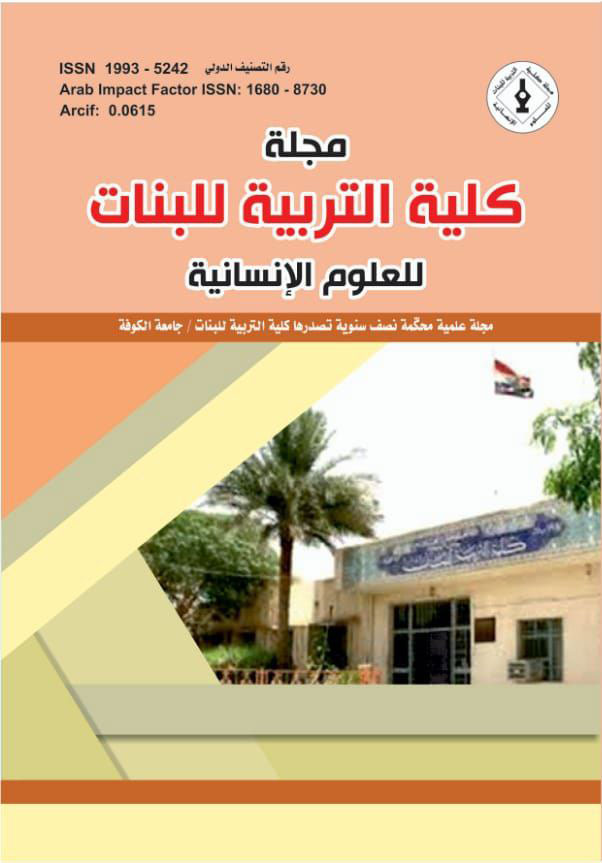Multiplicity of meaning in the Qur’anic text between hermeneutic interpretation and intentional interpretation
DOI:
https://doi.org/10.36327/ewjh.v1i26.14295Keywords:
النصِّ القرآنيAbstract
Abstract
The problems raised by the philosophical Hermeneutics in the interpretation of the Qur'anic text are based on a clear arbitrary view of the language, meaning that the word is not pregnant with the meaning, but merely the existence of the potential meanings of the meanings given by those who speak these words in a remote manner. In these words there is meaning. Of the language necessarily leads to the belief that all the texts have a symbolic metaphorical structure, and with regard to the divine books, they turn in this view into metaphorical symbolic linguistic blocks lack of prior indication, but add to the implications later, according to the hypothesis Which leads to the interpretation of the text, and it follows this arbitrary view to lose these books of God in general, and the Koran in particular, the attribute of guidance, because everything contained in it is not a true echo of the street according to appearances, but is a metaphorical metaphoric mass needs interpretation, not this It can be a verse in the Qur'an meaning and its opposite at the same time, without the existence of an interpretive criterion on which one can be judged as a misinterpretation, And on the other as a refuge True, right and wrong according to the Hermeneutic methodology have no existence in the traditional sense that is practiced by the wise men and philosophers so far, but they are both two-dimensional, this interpretive understanding of the Qur'an is true in Zayd. It is true, not because it is consistent with the objective, Because it agrees with the hypotheses and prejudices that Zaid started to understand the Koranic text, and this interpretation is a misinterpretation for Amr, which is actually wrong, but for Amr, who starts to process the understanding of the text of the hypotheses and theories are different, and we can not afford an interpretive view On the other, only on the basis of our presuppositions as well, and so all our views are right and wrong at the same time, and there is no criterion governing the interpretation, to be realistic in favor of this opinion on the other, this is not possible reality, because the text is not indicative, and as long as this is the case, our own interpretations can only be made from those hypotheses and theories that exist earlier in our minds, and there is no difference between those assumptions being revised or unedited, Performs the process of interpreting the text, so the whole net The interpretative answer to the Qur'anic text is equal in value and consideration.
Downloads
References
*القرآن الكريم.
- الاتجاه العلماني المعاصر في علوم القرآن الكريم-دراسة ونقد، الدكتور أحمد محمد الفاضل، مركز الناقد الثقافي، الطبعة الأولى، دمشق، 2008م.
- الإتقان في علوم القرآن، جلال الدين عبد الرحمن بن أبي بكر السيوطي، دار الفكر، الطبعة الأولى، لبنان، 1416هـ.
- البرهان في علوم القرآن، للإمام بدر الدِّين محمّد بن عبدالله الزركشي، خرَّج حديثه وقدَّم له وعلَّق عليه: مصطفى عبد القادر عطا، دار الفكر للطباعة والنشر والتوزيع، 1421هـ.
- بلاغة الخطاب وعلم النصّ، الدكتور صلاح فضل، الشركة المصرية العالمية للنشر-لونجمان، الطبعة الأولى، القاهرة، 1996م.
- التأويل بين السيميائية والتفكيكية، إمبرتو إيكو، ترجمة وتقديم: سعيد بنكراد، الدار البيضاء- المركز الثقافي العربي، الطبعة الثانية، المغرب، 2004م.
- التأويل والحقيقة، قراءات تأويلية في الثقافة العربية، د.علي حرب، دار التنوير للطباعة والنشر، بيروت-لبنان، 2007م.
- الصوفية والسريالية، أدونيس، دار الساقي، الطبعة الرابعة، بيروت-لبنان، 2010م.
- فصل المقال فيما بين الحكمة والشريعة من الاتصال، أبو الوليد بن رشد، دراسة وتحقيق: دكتور محمد عمارة، دار المعارف، الطبعة الثالثة، القاهرة.
- فهم الفهم – مدخل إلى الهرمنيوطيقا، نظرية التأويل من أفلاطون إلى جادامر، رؤية للنشر والتوزيع، الطبعة الاولى، 2008م.
- القرآن من التفسير الموروث إلى تحليل الخطاب الديني، د.محمد أركون، ترجمة: هاشم صالح، الطبعة الأولى، بيروت، دار الطليعة، 2001م.
- القرآن والمتغيِّرات الاجتماعية والتأريخية، محمَّد أبو القاسم حاج حمد، دار الساقي، الطبعة الأولى، بيروت-لندن، 2011م.
- الكلمات والاشياء، فريق الترجمة: مطاع صفدي- د.سالم يفوت- د.بدر الدين عرودكي- جورج ابي صالح- محمد اسطفان، مركز الإنماء العربي، الطبعة الأولى، بيروت-لبنان، 1989م-1990م.
- المدخل إلى السنن الكبرى، للحافظ البيهقي، المتوفي 458هـ، دراسة وتحقيق: الأستاذ الدكتور محمد ضياء الرحمن الأعظمي، أضواء السلف، الطبعة الثانية، السعودية، 1420هـ.
- مدخل إلى فهم الإسلام-الفكر الإسلامي..نظمه..أدواته..أصوله، يحيى محمد، الانتشار العربي، الطبعة الأولى، بيروت، 1999م.
- المرايا المحدَّبة من البنيوية إلى التفكيك، تأليف: د.عبد العزيز حمودة، سلسلة عالم المعرفة، رقم الكتاب في السلسلة: 232، الكويت، المجلس الوطني للثقافة والفنون والآداب، 1998م.
- معجم مقاييس اللغة، لأبي الحسن بن فارس، وضع حواشيه إبراهيم شمس الدين، دار الكتب العلمية، الطبعة الثانية، بيروت-لبنان، 2008م-1429هـ.
- مقدمة لدراسة التراث المعجمي العربي، الدكتور حلمي خليل، دار النهضة العربية، الطبعة الأولى، 1997م.
- (موت المؤلف) منهج إجرائيٌّ أم إشكاليةٌ عقائدية؟ د.عبد الخالق العفّ، بحثٌ منشورٌ في مجلة الجامعة الإسلامية (سلسلة الدراسات الإنسانية)، المجلَّد السادس عشر، العدد الثاني، يونيه، 2008م، ص60-61.
- النصّ الإسلاميّ بين الاجتهاد والجمود والتأريخية، الدكتور محمد عمارة، دمشق، دار الفكر، 1997م.
- النصّ القرآنيّ وآفاق الكتابة، أدونيس، دار الآداب للنشر والتوزيع، الطبعة الثانية، بيروت-لبنان، 2010م.
Downloads
Published
How to Cite
Issue
Section
License
Copyright (c) 2023 The teacher is Dr. Bassem Abdel Hussein Rahi Al-Hasnawi

This work is licensed under a Creative Commons Attribution 4.0 International License.
which allows users to copy, create extracts, abstracts, and new works from the Article, alter and revise the Article, and make commercial use of the Article (including reuse and/or resale of the Article by commercial entities), provided the user gives appropriate credit (with a link to the formal publication through the relevant DOI), provides a link to the license, indicates if changes were made and the licensor is not represented as endorsing the use made of the work.









